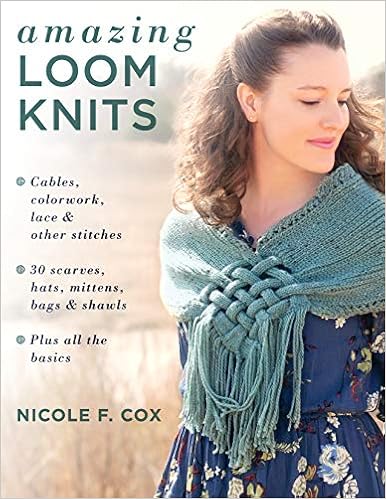This cast-on works the same in the round or flat. If your piece is worked in the round, you will just flatten your knitting and half your stitches. You can use stitch markers to mark the halfway points on each side of the knitting where the waste yarn meets the elastic or project yarn. For demonstration purposes, this tutorial assumes that you know how to cast-on and do the knit stitch.
Why do you do a provisional cast-on? This cast on is useful for joining pieces of your knitting seamlessly. This is useful in loom knitting since we do not always have enough stitches to do wide pieces such as a drapey cowl. If you don't have a large round loom you could loom knit your cowl flat (instead of in the round) and then join your pieces seamlessly. It's also great for starting socks, just cast-on using waste yarn/elastic cord and your stitches will remain "live" for seaming later. I also use this cast-on for ponchos and other garments.
Also included in this tutorial is how to join two pieces together without using knitting needles after doing this cast-on and notes on how to provisionally bind-off.
 |
| This cast-on will produce a seamless join similar to kitchener. |
 |
| Elastic thread is useful but not absolutely necessary. |
Follow the steps in this section for all provisional cast-ons, flat or in the round...This tutorial is not designed to teach you how to loom knit so the actual knitting process is not shown on the loom. You should already know how to e-wrap cast-on and do the regular (true) knit stitch before attempting this cast-on.
- Referring to the photo above: e-wrap cast on with waste yarn. Waste yarn can be used over and over again and should be a contrasting color to your pattern yarn. This will make it easier to see which is which.
- Knit at least 10 rows or rounds using waste yarn. Use the regular knit stitch (also called true knit). E-wrap knit stitch is not recommended for this cast-on. You may knit as many rows/rnds as you like with the waste yarn just make sure you give yourself enough fabric to work with.
- Knit 1 row with elastic cord. If you do not have elastic cord then skip this step. Elastic cord is just easier to pull out because it is slippery but regular yarn can be encouraged out of the knitting also (it just takes a little longer).
- Cut your waste yarn/elastic, leaving a 4 to 5 inch tail.
- Work (loom knit) your pattern as stated. You won't seam until your pattern is completed. Above is just a sample.
THIS IS THE END OF THE PROVISIONAL CAST-ON TUTORIAL. BELOW IS HOW TO JOIN TWO SECTIONS AFTER USING THIS CAST-ON.
Note: You can also bind off using a provisional bind-off. Just do the steps in reverse. When you finish your pattern, do not bind off in the regular manner...1st loom knit 1 row with elastic cord, then loom knit 10 rows (at least) with waste yarn, then bind off or remove the fabric from the loom.
How to join (after pattern is complete)...
The above picture is only an example as this tutorial is showing your two pieces, each with a provisional cast-on/bind off, being joined. You may be joining a side with a provisional cast-on to a side with a closed cast-on. Work them the same. If you have a closed cast on (on one side) then just pick up the edge stitches one by one.
Elastic cord was not used in the example below.
Elastic cord was not used in the example below.















